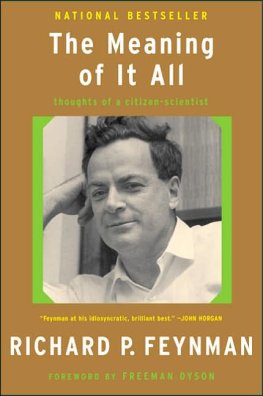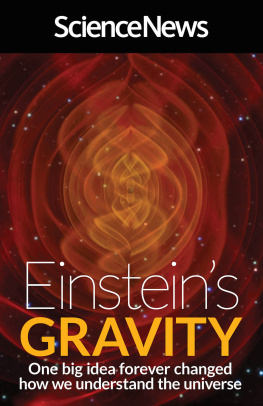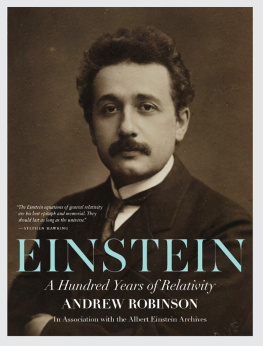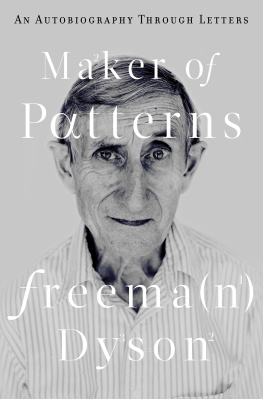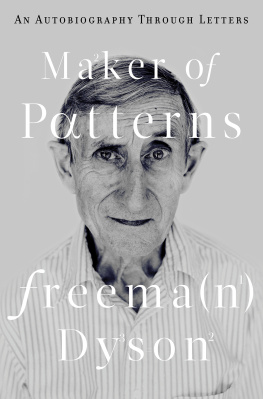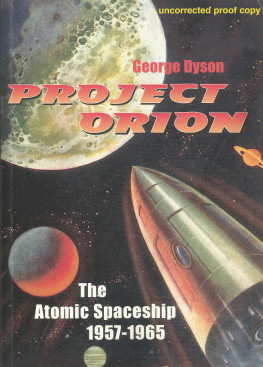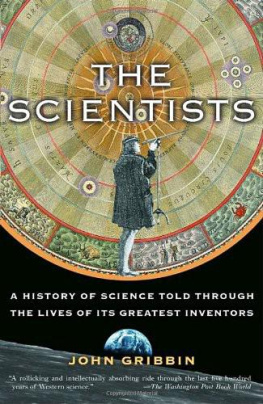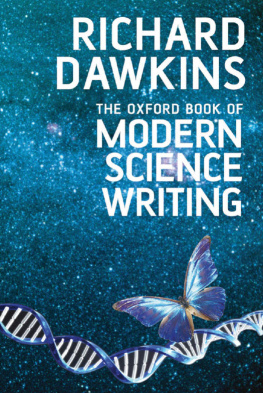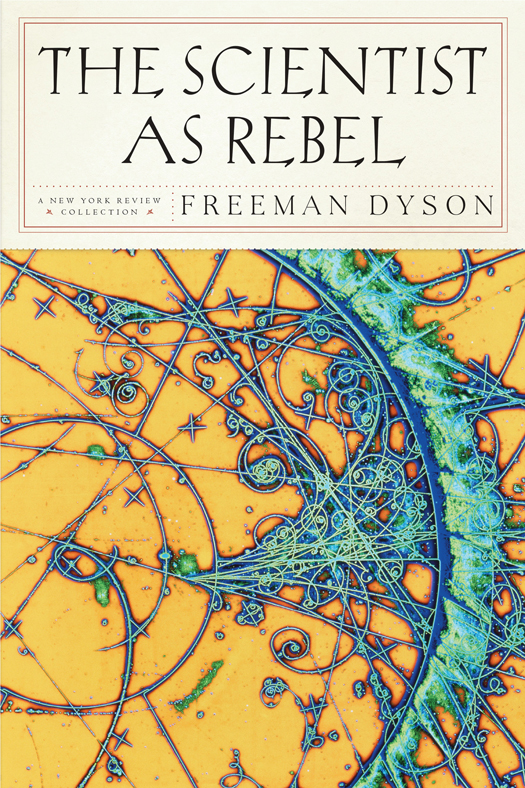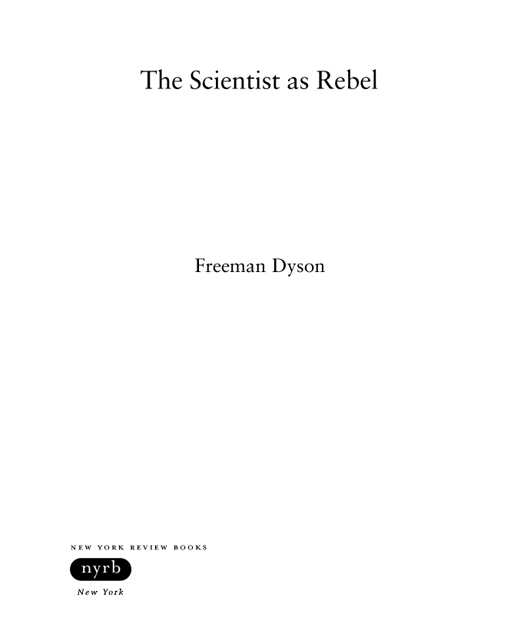THIS IS A NEW YORK REVIEW BOOK
PUBLISHED BY THE NEW YORK REVIEW OF BOOKS
435 Hudson Street
New York, NY 10014
www.nyrb.com
THE SCIENTIST AS REBEL
by Freeman Dyson
Copyright 2006 by Freeman Dyson
Copyright 2006 by NYREV, Inc.
All rights reserved.
This edition published in 2008 in the United States of America by The New York Review of Books
The Library of Congress has catalogued the hardcover edition of this book as follows:
Dyson, Freeman J.
The Scientist as Rebel / by Freeman J. Dyson.
p. cm.
Includes bibliographical references.
ISBN-13: 978-1-59017-216-2 (alk. paper)
ISBN-10: 1-59017-216-7 (alk. paper)
1. Science. 2. Physics. 3. ScienceHistory. 4. ScienceMoral and ethical aspects. 5. Dyson, Freeman J.Biography. 6. ScientistsUnited StatesBiography. I. Title. Q158.5.D977 2006
500dc22
2006022081
ebook ISBN: 978-1-59017-881-2
v3.1
To my teachers,
Eric and Cordelia James
Great brow, frail framegone. Yet you abide
In the shadow and sheen,
All the mellowing traits of a countryside
That nursed your tragi-comical scene;
And in us, warmer-hearted and brisker-eyed
Since you have been.
Cecil Day Lewis
Table of Contents
Preface
BENJAMIN FRANKLIN COMBINED better than anyone else the qualities of a great scientist and a great rebel. As a scientist, without formal education or inherited wealth, he beat the learned aristocrats of Europe at their own game. His victory encouraged him to believe that he and his fellow citizens in America, without much training in military strategy or international politics, could beat the aristocrats of Europe at warfare and diplomacy. Franklins triumph as a rebel resulted from the fact that his rebellion was not impulsive but was carefully thought out over many years. For most of his long life, he was a loyal subject of the British King. He lived for many years in London, representing the Commonwealth of Pennsylvania in dealings with the British government, calmly taking the measure of his future enemies.
While he was in London, Franklin was an active member of the Society for the Encouragement of Arts, Manufactures and Commerce, which still flourishes today. The society encouraged inventions and manufactures by offering financial subsidies and prizes to inventors and entrepreneurs. The prizes were usually available to all subjects of the King in England or America, but they were often targeted to subsidize colonial enterprises that the society considered desirable. When Franklin first joined the society in 1755, he was an enthusiastic supporter of its efforts to encourage invention, which he saw as complementary to the efforts of his own Philosophical Society in America. But as the years went by, his attitude became more critical. He never openly disagreed with the society and remained a member in good standing, all through the War of Independence and afterward until his death. But he recorded privately, in the margin of a book, his true feelings about the system of prizes and subsidies offered by the society:
What you call Bounties given by Parliament and the Society are nothing more than Inducements offered to us, to induce us to leave Employments that are more profitable and engage in such as would be less so without your Bounty; to quit a Business profitable to ourselves and engage in one as shall be profitable to you; this is the true Spirit of all your Bounties.
He wrote these words in 1770, five years before the outbreak of the war that ended British rule in the thirteen colonies.
Franklin became a rebel only when he judged the time to be ripe and the costs to be acceptable. As a rebel he remained a conservative, aiming not to destroy but to preserve as much as possible of the established order of society. As a diplomat in Paris, he fitted smoothly into the established order of prerevolutionary France. He would not have fitted so well into the France of Danton and Robespierre ten years later. The rebellion that Franklin embodied was a thoughtful rebellion, driven by reason and calculation more than by passion and hatred.
In spite of its title, this book is mostly not about rebel scientists. It is a collection of book reviews, prefaces, and essays on a variety of subjects. The majority were published in The New York Review of Books. I am grateful to The New York Review for inviting me to collect these in a book, and for allowing me to supplement them with other pieces that were published in other places. The bibliographical notes at the end explain where each piece was published and how it originated. ) that are concerned with soldiers rather than with scientists.
One of the pleasures of writing for The New York Review is the fact that it publishes long reviews. The reviewer is asked to write about four thousand words, which means that the review can be an essay reflecting on the subject matter rather than a simple appraisal of a book. The short reviews in this collection were published in other journals. If this book is a sandwich, the meat is the series of twelve long reviews from The New York Review, most of them appearing in Section III. There are four other meaty items that were not in The New York Review. One is the Bernal lecture () are chapters from my book Weapons and Hope, which is now out of print. The collapse of the Soviet Union made much of Weapons and Hope obsolete, but these three historical chapters may be worth preserving.
The essay The Scientist as Rebel, with which this collection begins, originated as a talk given at a meeting of scientists and philosophers at Cambridge, England, in November 1992. The talk was dedicated to the memory of Lord James of Rusholme, who had died six months earlier at the age of eighty-three, full of years and honors, having risen to the top of the British educational establishment. The obituary notices that were published in newspapers after his death described him as a capable organizer and administrator who presided over the founding of York University and served as its vice-chancellor for the first eleven years of its existence, from 1962 to 1973. They said that he had conservative views on the subject of education, that he believed in old-fashioned scholarship and academic rigor, that he fought hard to make York University a community of scholars and an intellectual powerhouse on a level with Oxford. Jude the Obscure, he was quoted as saying, need no longer look despairingly at the towers and spires of an inaccessible university, provided he has three good A-level passes, can satisfy one of a multiplicity of entrance requirements, and is prepared, if necessary, to do without spires. He tried to make York University the home of an intellectual elite, an elite based upon brains and competitive examinations rather than money and social class. His elitist view of education came into collision with the dominant political currents of the 1950s and 1960s. The dominant view held that Jude should be enrolled in a university whether or not he was able to pass the A-level examinations. The dominant view held that higher education should be for everybody and not only for the bright. In the end, Lord James fought in vain against what he considered the folly of the politicians. Whenever he lost a battle in his campaign for strict intellectual standards, he liked to quote the lines of the poet Matthew Arnold:


